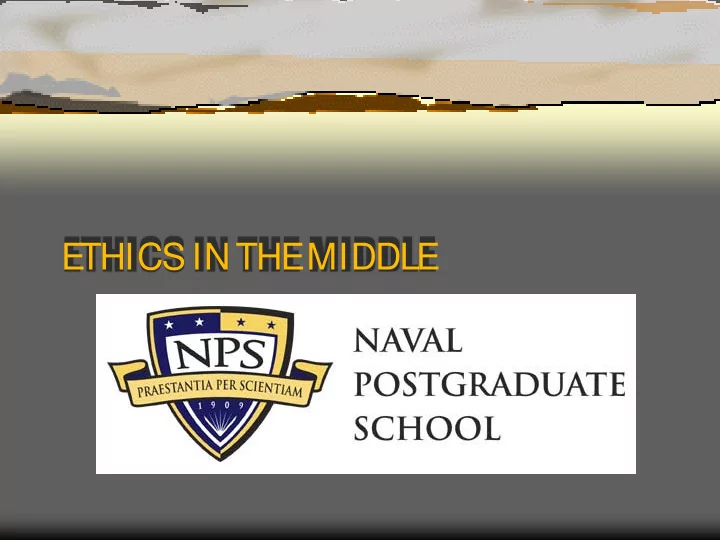

E THICS IN THE MIDDLE
Aren’t all leaders ethical? Remember Politicians, e.g., Bill Clinton and Richard Nixon Executives, e.g., Ken Lay and Dennis Kozlowski Military officers, e.g., Ollie North and NPS students Presumptions Mid-grade officers are rarely moral bankrupts Slippery slopes and unintended / unforeseen consequences lead to groundings and collisions Hard moral choices are between 2 goods or 2 evils 12/10/2009 2
Overview Scanning the Horizon – 7 Constellations 1. Honesty/integrity 2. Just war 3. Use and abuse of power 4. Responsibility for money and things 5. Administration of justice 6. Instrument of social change 7. Leadership Viewing Platforms: 3 Approaches to Ethics A Caveat Preventative Medicine 12/10/2009 3
1) Honesty and Integrity Honesty: Survey Loyalty Midshipman: Will you “rat” out a classmate? Unit/group With whom are you completely honest? Self? Are you the same person 24x7? Others? 12/10/2009 4
2) Just War Not should we fight, but how to fight Principles (for the warfighters!) Reasonable chance of success “I have not yet begun to fight” OR “Live to fight another day” Non-combatant immunity (Discrimination) – Missile emplacement in school or hospital – Human shields – John Paul Jones: a terrorist? Proportionality 12/10/2009 5
3) Use and Abuse of Power Privilege of position Arnheiter affair Taking responsibility “Own” your mistakes Do you intervene when you observe a wrong? – By subordinates – By seniors? “Bending” the rules Gun decking logs and PQS Fraternization with subordinates 12/10/2009 6
4) Responsibility for Money and Things Responsible for equipment and people Osprey Iowa DUTY Primary virtue for military personnel. Duty to Constitution overrides other duties. Military subordinate to civilian authority yet Navy has institutional history of deceit. 12/10/2009 7
5) Administration of Justice We investigate Investigation implies guilt Who should investigate? We administer NJP What is equal treatment? Justice versus Mercy We evaluate Subordinate with moral failure -- FITREPs Actions to block career not match words of praise -- Evals Favoritism -- sea daddies 12/10/2009 8
6) Instrument of Social Change Integration of racial minorities How complete? Look at this group Persistence of racism Integration of women Stonewalling, continued prejudice, power of language Private opinion contrary to public policy Impact of pregnancy rates on operational readiness Gays: Don’t ask, don’t tell 12/10/2009 9
7) Leadership Personal success at what price? Careerism – Spin: best face for whom? – Ticket punching – Desired answer or real answer Distributed responsibility (Kobar towers; policy formulation) Mission accomplishment vs. people Operational, personnel and training tempo Little Round Top Training/fiscal realities vs. Environmental issues 12/10/2009 10
Viewing Platforms Law establishes ethical minimum not moral excellence Making moral choices –Is this allowed? –What will happen if we do this? –Would a person I respect do this? 12/10/2009 11
Rule based – “Is it allowed?” Basis A rule says the action is inherently right/wrong Legal authority Sacred traditions Culture Ethical Theories Laws/Directives/Orders Duty (Deontological) Divine Command Mores/Common Morality 12/10/2009 12
Result based – “What will happen?” Basis Will it produce a desired result? Identify/predict goals, results and benefits Teleological: end justifies the means Ethical Theories Consequentialism – balancing good and bad outcomes Utilitarian – maximize benefit for greatest number Egoism – do whatever is best for me and only me Pragmatism – what works must be right 12/10/2009 13
Person based – “… a person I respect… ” Basis How treated, what they would say, their example Rights: Individual or Group Relationships Character Ethical Theories Liberal Individualism – maximize individual rights Communitarianism – priority of community Ethics of Care – commitment to relationships Virtue – habits of choosing right; build moral character 12/10/2009 14
prohibited Rules based conditional Legal authorized Religious required noble Cultural destroy Result based hamper Goals no effect advance Possible results achieve Person based no Respect rights? not very somewhat Respect relationships? yes Virtuous? greatly 12/10/2009 15
A Caveat – Moral Risk Factors Urgent personal goal Critical juncture Unexpected and unwanted event Negative role model Possible way out Stress Time constraints 12/10/2009 16
Preventative Medicine Establish accountability Making time for moral health Spirituality Reflection Family 12/10/2009 17
Where we’ve focused Scanning 7 Constellations of ethical issues Honesty Money and things Just war Administration of justice Power Social change Taking leadership 3 Viewing Platforms for Ethical Decision Making Rules Results Persons – Rights, Relationships, Character Risk Factors and Preventative Medicine 12/10/2009 18
E thics Instructors G. M. Clifford, CAPT, CHC, NS4903 Tough Choices USN – Ethics in the Middle 127 Herrmann Hall offered Fall and Spring 656-2241 NS4904 Ethics Across Gmclifford@nps.navy.mil Cultures -- Comparative M. W. Smith, CDR, CHC, Ethics and Religions USN offered Winter and 126 Herrmann Hall 656-2241 Summer Mwsmit1@nps.navy.mil 12/10/2009 19
Case studies Two most critical issues in your case: honesty, use of power, war, caring for what is entrusted, rights, justice, leadership, etc.
Recommend
More recommend